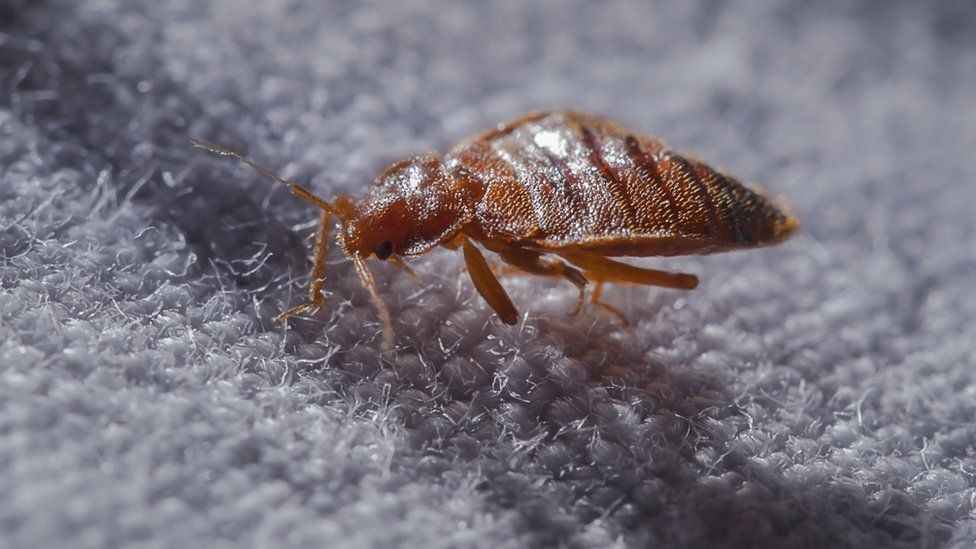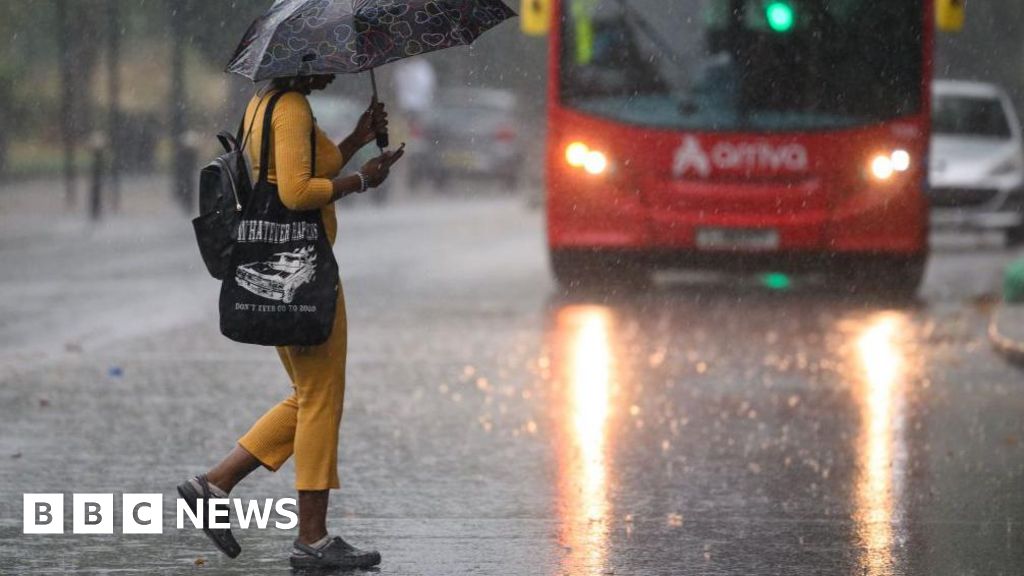ARTICLE AD BOX
 Image source, Spotta
Image source, Spotta
By Dougal Shaw & Daniel Thomas
Business reporters, BBC News
"A fortnight ago we had a detection of a bedbug and it's frightening," says Max Malka, owner of the Montlhery Paris Sud Hotel, 15km south of Paris.
You don't know if bugs are moving between rooms, he said, and you risk being sued if a guest is bitten badly.
His is one of many firms seeking solutions amid a rise in reported outbreaks in France and the UK.
And firms are turning to tech - both old and new - to catch outbreaks early, which is vital to stopping the spread.
There is growing public concern about the insects, with hotels, transport companies and local governments all facing enquiries about the issue.
Pest control company Rentokil said it saw a 65% jump in cases of bedbugs in the UK in the second quarter of 2023, compared with a year earlier.
And Luton Council issued guidance to local residents this week on how to handle an outbreak, after dealing with an "alarming number" of calls about bedbugs.
Mr Malka points out that hotels in Paris can expect to get a case once a year. Guests bring them as they travel, usually in the summer season.
In the end, he paid a pest control firm €1,500 (£1,300) to eradicate the bugs before they spread.
This was after he invested in a new kind of monitoring technology developed by a UK start-up called Spotta. It enabled him to detect his case of bedbugs early.
He is so proud of his system that he has stickers in his hotel telling customers it is in place for their reassurance.
Image source, Spotta
Image caption,Spotta's small devices sit between mattresses and bedframes
"It's important to catch bedbugs early," says Robert Fryars, boss of Spotta, which is based in Cambridge, "because you can go from two bedbugs to thousands in the space of months."
An adult female can lay around 400 eggs in her short lifespan - a matter of months, depending on the temperature. The eggs take about two weeks to incubate.
Mr Malka's Spotta device is a small plastic box that contains a pheromone chemical designed to attract bedbugs. In hotels, the devices sit between mattresses and bedframes.
If a bug crawls inside, a small camera takes a picture and sends it over the internet to a central database.
A combination of artificial intelligence software and the human eye confirms whether a bedbug has indeed been caught. If so, a mobile phone alert warning is sent to relevant managers.
"It's a bit like a Covid test for bedbugs," says Mr Fryars.
Once a bug has been detected, chemical pesticide or heat treatment pest control measures can be taken, before the problem has spread. Hopefully this means few customers will see the bugs, or share their experience on social media.
Image source, Getty Images
Image caption,Hotels are keen to avoid bad bedbug reviews online
The company that pioneered this early-detection approach is Finland's Valpas, founded in 2013. It has signed deals with many luxury hotels across Europe.
It has designed a digitally-connected bug trap that is integrated into the custom legs it makes for beds. It has raised more than $2m (£1.6m) in venture capital funding.
Bugs crawling up the bed to bite humans are caught in a cavity and the traps then send a signal over the internet to alert hotel owners.
Like Spotta, Valpas has had to overcome the stigma around the idea of a hotel needing to have "pest control" in the first place - it's not the first thing you put on adverts.
However, as the bedbug issue is becoming more prominent in the news and on social media, many hotel chains now see merit in showing that they are being proactive about it.
Image source, Getty Images
Image caption,Sniffer dogs are increasingly used to detect bedbugs
Another popular way to get an early alert about bedbugs comes not from high tech, but man's oldest friend.
It takes from around six months to train up sniffer dogs who specialise in bedbugs. But once they've graduated, they are highly effective.
The dogs don't require any maintenance and they don't risk any technical faults or going offline. However, they can't be onsite every day and it takes them a long time to check a large hotel, room by room.
Rentokil is using sniffer dogs in the fight against bedbugs. Using a backpack vacuum, trained technicians collect an air sample from, for example, a hotel room. The samples are then sent to a facility where Labrador Retrievers, German Shepherds, Beagles or Belgian Shepherds smell them and alert their handlers.
Paul Blackhurst, head of Rentokil Pest Control's Technical Academy, told the BBC that dogs "detect the presence of bedbugs, often long before a human would be able to spot any warning signs".
Bedbug numbers have been steadily rising for the past decade, and after a dip during Covid, when people weren't travelling, there has been a marked spike in the last year. Bugs can travel on our clothes or in our luggage. Rising global temperatures are also likely a factor.
However, despite a jump in enquiries "above expected seasonal patterns", Mr Blackhurst thinks the panic in the UK is "slightly overblown".
"The risk of encountering bedbugs for those visiting UK venues remains low, and by taking some simple precautions when staying overnight then travellers can help to protect themselves, such as carefully examining the bed, mattress and surrounding areas for any signs of bedbugs, such as dark stains, faecal pellets, shed exoskeletons, or even live bugs."
Kate Nicholls, boss of trade group UK Hospitality, told the BBC there was "no indication" UK hotels were facing the same problems as French ones and said the sector had "robust cleaning and hygiene processes" in place.
Nevertheless, any anxiety caused by outbreaks will be worrying for an industry that has been under huge financial pressure due to issues like the pandemic and the cost-of-living squeeze.
Finding money to pay for bedbug detection systems may seem like a stretch too far for many hotel owners. Yet the potential fall in revenue if you gain a reputation for a bedbug outbreak also needs to be taken into account, argues Spotta's Mr Fryars.
In fact, one method the firm uses to detect new potential customers among hotels is by trawling TripAdvisor to find customer reviews complaining about bedbugs.

 1 year ago
32
1 year ago
32








 English (US) ·
English (US) ·